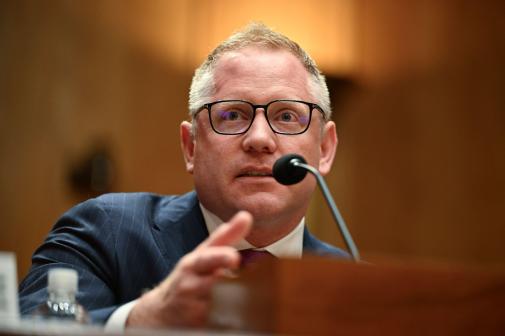DHS nominee Kristi Noem stood alone for rejecting department cyber grants to state, local governments

President-elect Donald Trump’s selection of Kristi Noem to lead the Department of Homeland Security bodes poorly for the agency’s cybersecurity grants to state and local governments, given her opposition to the program while serving as chief executive of her state.
Trump will nominate the South Dakota governor to serve as secretary of DHS, numerous news outlets reported Tuesday.
Her administration in 2022 called the combined $1 billion grant program “wasteful spending” by the federal government when her state was one of only two in the nation not to seek any funding from it. In 2023, South Dakota was the lone holdout.
“Federal spending often comes with strings attached, and more of it is often not a good thing,” Ian Fury, a Noem spokesman, said in an emailed statement to South Dakota Searchlight in 2022. “These dollars would have required us to set up a new committee, create an ongoing program with one-time dollars (something we never do), and the administrative burden would have far exceeded the allowable administrative cost.”
DHS’s budget isn’t entirely the responsibility of its secretary, as the White House makes the budget request and Congress appropriates the funds, but a secretary who opposes sending cyber grants to states could have sway on the matter.
But Noem has otherwise promoted the cybersecurity industry and signed bills into law in her state meant to bolster cybersecurity there.
“Cybersecurity is South Dakota’s next big industry,” she said last year, a phrase she repeated last month on Instagram. “South Dakota is in the middle of the country — and we’re landlocked, so foreign spy ships and subs can’t reach us. It makes a lot of sense for cybersecurity resources to be centered here.”
Noem touted Dakota State University as the first university to establish a Ph.D program in cyber operations and its partnership with U.S. Army Cyber Command. She also talked up the state’s growth in scientific and technical services jobs.
In March, Noem signed into law a bill that would devote $7 million to the state attorney general to create a cybersecurity services initiative for counties and municipalities in the state to protect their systems.
The state Bureau of Information and Telecommunications, along with Dakota State University and the South Dakota Fusion Center, announced a Cybercrime Prevention Consortium this summer.
“This collaboration is essential for staying ahead of sophisticated cybercriminals, safeguarding our state’s digital assets, and ensuring the resilience of our critical infrastructure,” said Miguel Penaranda, the state’s deputy chief information security officer. “By working together, we can create a stronger, more secure digital environment for all South Dakotans.”
Noem named Madhu Gottumukkala as state chief information officer in August. He told StateScoop his short-term priorities included cyber training for state employees, and his long-term goals included modernizing state government systems.
CyberScoop couldn’t reach spokespeople for the Trump campaign, Trump transition or governor’s office for immediate comment.






